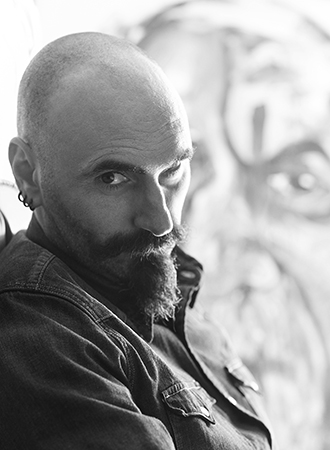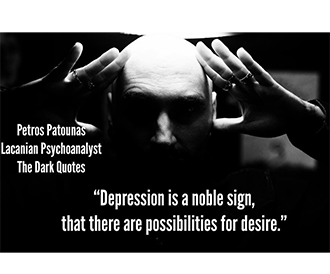What is impossible to bear is the Ethic of desire, too much of an oral object for a technician’s stomach∙ the misrepresentation of formalization, one limited to a small area by the gonioscopy of mastery, has been proved possible, as the ethic of desire is impossible because analysts squander their tongue’s propositions in uttering a premise for its sake and not its essence, talking about after all a curing science: there are diminutive amounts of orientating new analysts but too much cure, and analysts have become the extraordinary coincidence of a circus’ arena within associations or schools∙ that failure, certainly, does not cease to not write itself, and baring that Real does not desiderate a body but an ethical motion, not a position, for one’s desire. Simply that∙ for whom, then, is the real impossible to bear, if not for the analysts or a given school, for as long as analysts converse of the sessions within the structure of a formalization, not being able to learn anew an alphabet speaking for themselves, then, surely the letter does not have its baring and possesses the gloomy ambiance of a ceiling, forbidden to escape, lynching above desire like the sword of Damocles∙ and, since there are, even to this year, questions of the symptom’s measurement and separation, as been clinical or not, we could pull our eyelids and sponge down our hands before saying that it is the analyst who is clinical or not, when he is uncoordinated from the culture and sheltered into the fantasy of psychiatry’s throne: bearing a desire does not require one’s body- it is braying that depends upon a body: and that is the zetetic.
And, about the presentation of cases by those deacons of misery specialized in the thanatosis of the wish, let us simply say that analysts ought to necessitate in discovering how to enlighten stories not from paper, not too dreary for the ears and optimistically to tease enough one’s enthusiasm- stories that are not theirs, but it is such a difficult task when one trades the ethics of the cause: and if there is a further utterance, a feeble one tyrannizing this generation’s minds and makes psychoanalysis an amount of sordid hors d’oeuvre, this is the structure of the impossible to bear and the impossible of the practice of psychoanalysis: psychoanalysis, my dear friend, is not practiced but lived- for when at that point where a subject diagnoses its desire is not only for utilizing it only within the sessions as if it is some breed of an abracadabra∙ and if we are in love with using the word clinic, with or without the ostentatious vocabulary commendable of a baroque epoch, and exonerations that we do not fundamentally trust, then, the clinic is that of the letter and desire, and, for that we ought to know at least a word to say about: about the Ethic repressed. An experimentation praiseworthy of a commendable amusement would be to illegitimate analysts’ reading from papers with reference to their experiences in the sessions, but, instead, let them perorate and free associate- and the thaumaturgic statement of the impossible to say will glare itself in front of the spectators’ Achilles heel, to allow that free association: it is impossible to say because analysts cannot Act, stuttering their desire, for, that which cannot be said is an Act∙ one ought to think, however, what is not allowing them to speak- and that, according to Freud, is for the love of the parent.
Silence in this case is not the speech of the Act, the doing of desire- speech here is the trauma: what is unfeasible to bear and said is desire, which is not lazy∙ and, if there is an impossibility in psychoanalysis, this is nothing else than the forgotten desire by a school, an orientation and analysts themselves∙ let us produce convinced low-tuned whispering reverberations, like old men, about case presentations and catechize by testing the waters, what can we take notice of from the apostles and the infamous Acta Apostolorum, stated under oath in a confident manner, which is a good pass and a testimony: when one’s being is dedicated to desire. And, a thunderous signifying chain, whose signifieds emphasize meaning through questions, about the subject whom the orientation could describe as been under the anathema of the impossible to say, impracticable to speak, that is the assemblage of analysts in a congress, who, not been daring enough to heave their voices they prefer reading from a piece of paper- what a somniferous attitude towards the Cause, too many bores opiate desire- those, those who are not able to speak, those who are bounded with an eternal commemorative moment of silence, and who are not the same from the impossible to say of the analysand: and many, misologysts of desire, under the vow of a true silence, because of the fear of losing the love of the Other, ought to think that at least monks’ silence is accompanied by a practice and an Act, much different, yet again, form this class of an Omertà.
Das ist nicht nur nicht richtig, es ist nicht einmal falsch– this is what symphonizes psychoanalysis as been a pseudoscience: when the analysts’ speech is not oriented by desire∙ it would be an invocation accompanied by a flight of the imagination, if those misologysts have been at least a bit Laconian and less Lacanian, to talk little but precisely. There is also something else to echo one’s thoughts on, to become skilled at the exchange of phonemes, and make our pitiful common sense to amend the questions orienting the practise- that, Spartan students were biting their thumps to castigate themselves because they rambled too much their responses∙ the trauma of lalangue is present in analysts’ inability to speak without preparation in front of an audience- they are not responsible for their words and that is the Sinthome of a bad approach to speech itself: it is unquestionably clinical my dear friend. Get them to speak, to free associate without quotes or texts and see if they can bear the responsibility of their word- then, truly, then the impossibility of the Real, the ethics of desire, will be vivid, too vivid to engross in the symbolic.
The Psychoanalytic Act: On the Formation of the No-Body.
By Petros Patounas.
The School of the Freudian Letter Publications.

